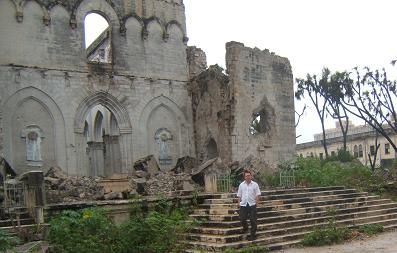One Step at a Time

I haven’t done a very good job, but in my posts about Amanda Lindhout and Nigel Brennan I’ve tried to avoid using a know-it-all, old-Africa-hand tone. But the truth is that from the moment they were kidnapped it was obvious that they had only themselves to blame. There’s nothing wrong with throwing yourself in at the deep end and pushing yourself to the limits to bring back back an otherwise unreported story. The problem is when you put other people at risk through naivety and inexperience.
The hack pack in Nairobi had never heard of Lindhout and Brennan when they disappeared. That in itself was a bad sign. Anyone heading to Mogadishu should take a few days talking to people who know the place – the Somali journalists exiled to Nairobi, the international press corps who have parachuted in and out, and the NGOs and UN agencies who try to keep aid flowing into a broken country- to find out the latest security information.
Hotels in Mogadishu come in and out of fashion. Who has the best security and which part of the city is free from shelling?
Which stringers are operating in Mogadishu, and who has the best contacts and feel for the situation in the ground?
These are the sorts of thing you learn to ask over weeks and months reporting from increasingly hostile places. My first trip to Somalia was carefully organised by the United Nations. There were two more trips to Baidoa, at a time when it was relatively stable. Only then – and at a time when the fighting had calmed – did I feel confident enough to make a trip to Mogadishu.
In contrast, Lindhout and Brennan seemed unprepared for what they faced.
This piece in The New York Times sums up the lure of wars for the newbie…
Wars have long provided a way into journalism for some adventurous aspiring reporters (as well as death, kidnappings and injury for others). And courageous, if inexperienced, freelancers have brought important stories to light that might otherwise have gone unreported.
But it goes on to spell out how the pair lacked experience
Robert Draper was already in Somalia on an assignment for National Geographic when Ms. Lindhout and Mr. Brennan arrived. Mr. Draper said that it was apparent that she had been the driving force behind their trip. She had met Mr. Brennan backpacking in Ethiopia. While Mr. Brennan was in Somalia as a photographer, Mr. Draper said, it was not clear whether he had ever sold any photographs.
“She was eager to make a name for herself, and I don’t say that as a negative,” Mr. Draper said. “But a lot of the early and intermediate steps one does to become a journalist, she bypassed. Amanda was very eager to go where the action was.”
They were released after 15 months. But not without a hefty chunk of cash being paid to their kidnappers. Paying up is the only way to get people out. Yet once again the armed gangs are richer and emboldened. Journalists mean cash. And for the long suffering people of Somalia, the two-decade cycle of violence shows no signs of ending.
